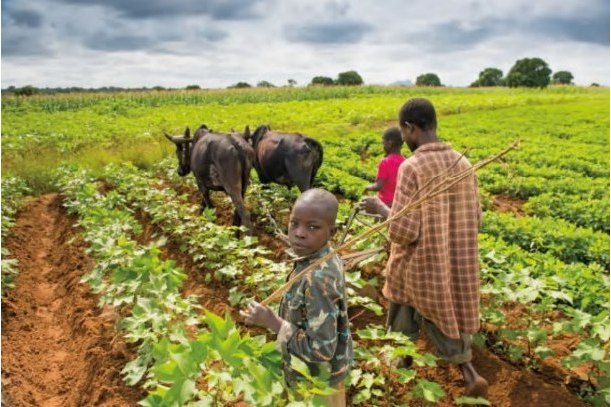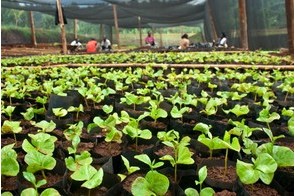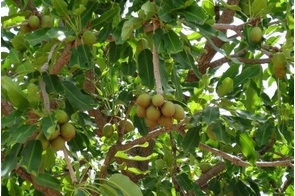Why contract farming is necessary in Nigeria

Summary
More food processing companies in Nigeria should be encouraged to enter into partnership agreements with smallholders.
A report on poverty and inequality in Nigeria released by the National Bureau of Statistics (NBS) last May shows that more than 82 million people in the country live below the national poverty line of N376.5 a day. This amount, which is less than $1, is too low to meet basic daily needs of feeding, not to mention utilities, transportation and other essentials. According to the latest data available, Nigeria's unemployment rate in the second quarter of 2020 was 27.1 per cent, while the rate of youth unemployment was 34.9 per cent in the same period.
The government, in a bid to lessen the burden of poverty and unemployment, has been encouraging young people to take up farming. However, because of limited financial support and technical know-how, among other limitations, the majority of young people resorting to agriculture are smallholder farmers.
Although smallholders produce as much as 80 per cent of the food consumed in Africa and Asia, as reported by the Food and Agriculture Organization of the United Nations (FAO), they are among the poorest farmers in the world. In other words, the aim of moving people out of poverty, especially young people many of whom are unemployed graduates, becomes largely unachieved.
Smallholders are faced with several challenges that hinder them from scaling up or gaining access to markets, thereby limiting their productivity and profitability. For instance, they are easily affected by spikes in prices, effects of climate change, crop failure and other risks associated with farming. In contrast, large or industrial-scale farmers are able to achieve competitive increase in productivity using machines, improved cultivation methods and crop varieties, farm insurance packages, among others. Another advantage of large-scale agriculture is the higher capacity to access markets both locally and internationally.
Contract farming – which can be described as a partnership between farmers and processing companies or government bodies for the production and supply of farm produce sometimes based on predetermined prices and quantities – can help reduce many of the risks and limitations of smallholders. In contract farming, farmers grow crops based on specifications given by partner institutions that are committed to buying these produce immediately they are harvested. A written contract is used to establish the relationship stating the conditions both parties must fulfil over a specified period of time.
Under such arrangement, the farmers have an obligation to supply specific quantities and quality of agreed farm produce at specified times. The companies or government bodies receiving the supplies pay the farmers directly. The producer-buyer relationship provides direct market access for farmers and also helps processing companies and other agribusinesses make key investment decisions as they are assured of consistent supply of farm produce.
In Kenya, for example, coffee and tea growers often have agreements with coffee and tea factories that the farmers sell their crops to and get paid at specific dates towards the end of the year. The agreements also enable the farmers and the off-takers to negotiate standard prices that are fixed by the government.
Contract farming is an important tool that is used in reducing post-harvest losses, especially for perishable crops like tomatoes, vegetables and fruits. When the contract conditions are complied with by both parties, marketers or factories can organize the transportation of farm produce, providing cost savings for farmers with regard to transportation. When farmers have a guaranteed ready market for their produce, about half of their problems are solved.
Apart from having a ready market, there are other benefits to contract farming, especially for smallholders. A major challenge faced by smallholders is lack of access to funds. Farmers can use valid working contracts to access financing from banks to meet buyers’ demand. With access to funds, smallholders can procure inputs, machinery, and other substantial investments.
When industrial entities stand as guarantors for farmers under contract farming arrangements, it is almost impossible to hear about cases of diversion of credits by farmers and incidents whereby people impersonate farmers to obtain agricultural credits from both government agencies and banks. Hence, a successful relationship with corporate organizations as is the case in contract farming helps to boost the reputation of genuine farmers and ease access to financial support.
Contract farming also empowers farmers with technology and skills transfer. This helps in enhancing the quality of farm produce. Agribusinesses stand better chances of getting access to new technologies and cultivation techniques required for their produce to meet the standards for export from corporate organisations than from government extension workers. This is because the expected returns of boosting farmers’ productivity are higher for processing companies and other corporate partners. A producer-buyer relationship is, therefore, a win-win for both parties in contract farming arrangements.
A fixed pricing structure in contract farming guarantees income and protects farmers against fluctuations in food prices. Although prices are often determined in advance in farming contracts, the prices in some cases may depend on the prevailing market price of the commodity at the time it is delivered.
More food processing companies in Nigeria should be encouraged to enter into partnership agreements with smallholders to provide ready markets for their produce and support local farmers. Such agreements will enable farmers to overcome risks and uncertainties, financial difficulties, shortage of production inputs and lack of technical assistance.
The processing companies also stand to gain from contract farming. Instead of growing the crops by themselves and investing heavily in vertical integration, such companies can save the cost of coordinating different stages of production by partnering with farmers who already have the land.
Producer-buyer relationships in contract farming are also crucial in averting outbreaks of pests and diseases that can potentially disrupt not only multiple farms but also the supply chains of buyers and cause unexpected shutdown of industrial activities. For example, Dangote Tomato Processing Company in Kano, Nigeria, which has a capacity to process 1,200 tonnes of tomato pastes daily, suspended operations in late 2017 for about two years partly because of the inability of contracted tomato farmers to supply fresh tomatoes for processing. Tomato farms had been ravaged by the outbreak of Tuta absoluta, a leaf moth popularly called ‘tomato ebola’, that destroyed several hectares of tomato farms in 2016.
The pest resurfaced in the country again this year. Adequate preparedness for incidents like this and other challenging situations can counter some of the setbacks of contract farming for both farmers and processing companies.
It is also important for processing companies and other companies who enter into partnerships with farmers to exhibit fairness in terms of payouts to farmers. This is to ensure that farmers don’t just become labourers in their own farms by failing to pay them reasonable returns.
The government can play a pivotal role in contract farming. For example, they can facilitate agreements between investors and farmers for both crop and livestock farming. Local and foreign investors interested in participating in the Nigerian agriculture value chain should be incentivized through favourable government policies, for example, through strategic partnership frameworks like contract farming.
Government agricultural agencies should create up-to-date directories of verified farmers and make them accessible for investors. Such agencies must be actively involved in ensuring that farmers get better prices for their produce as they go into partnerships with other agribusinesses, processing companies and investors.
Ultimately, contract farming is one of the tools that can improve the livelihoods of young people taking up farming and also support the country’s food security agenda.
Financial Nigeria Columnist, Mojisola Karigidi, is a Nigerian biochemist and the founder and product developer at Moepelorse Bio Resources. She is also a Global Innovation Through Science and Technology (GIST) awardee, and an Aspen New Voices fellow.
Related
-
Uganda's Grainpulse receives $11 million from IFC to support farmers
The investment will enable Grainpulse to support its expansion and increase food production in Uganda.
-
Shea nut can unlock Ghana's agro-diversification and industrialization
As a critical input to high-end cosmetics, shea nut could rapidly move up the production scale.
-
Africa can double agricultural productivity in the next five years - IFAD president
Nwanze said supporting small-scale farmers, investing in rural areas can help meet Africa’s development objectives.








